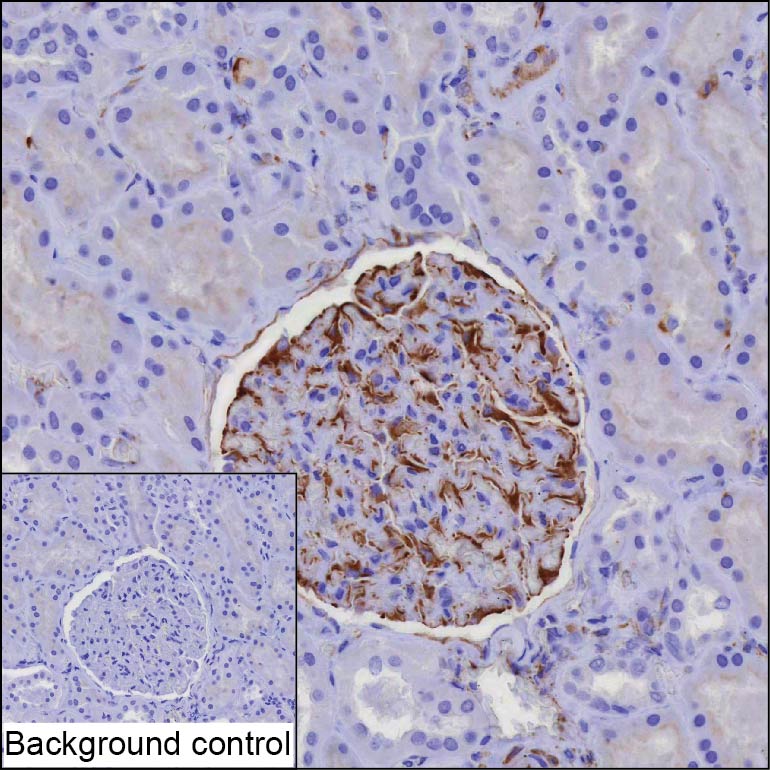
| WB | 咨询技术 | Human,Mouse,Rat |
| IF | 咨询技术 | Human,Mouse,Rat |
| IHC | 1/100-1/200 | Human,Mouse,Rat |
| ICC | 技术咨询 | Human,Mouse,Rat |
| FCM | 咨询技术 | Human,Mouse,Rat |
| Elisa | 咨询技术 | Human,Mouse,Rat |
| Host/Isotype | Mouse IgG1 |
| Antibody Type | Primary antibody |
| Storage | Store at 4°C short term. Aliquot and store at -20°C long term. Avoid freeze/thaw cycles. |
| Species Reactivity | Human |
| Immunogen | Purified recombinant fragment of human IGF1 |
| Formulation | Purified antibody in PBS with 0.05% sodium azide |
+ +
以下是3-4篇关于IGF1抗体的文献摘要概括:
1. **文献名称**:*Targeting the insulin-like growth factor-1 receptor in cancer therapy*
**作者**:Sachdev D, Yee D (2015)
**摘要**:探讨IGF1受体(IGF1R)抗体在癌症治疗中的作用,包括抑制肿瘤细胞增殖、增强化疗敏感性的机制,并总结临床试验中抗体药物的疗效与挑战。
2. **文献名称**:*Development of a human monoclonal antibody targeting IGF-1 for cancer therapy*
**作者**:Yee NS, et al. (2018)
**摘要**:描述通过噬菌体展示技术开发人源化IGF1抗体的过程,验证其体外抑制肿瘤细胞生长及体内抑制小鼠移植瘤生长的效果,强调其低免疫原性优势。
3. **文献名称**:*Blockade of IGF-1 receptor signaling inhibits growth of human colorectal cancer cells*
**作者**:Gödecke C, et al. (2009)
**摘要**:研究IGF1中和抗体对结直肠癌细胞的影响,发现其通过阻断IGF1与受体结合,抑制下游PI3K/AKT和MAPK信号通路,从而诱导细胞凋亡。
4. **文献名称**:*Anti-IGF1R antibody cixutumumab in preclinical models of osteosarcoma*
**作者**:Pandya GJ, et al. (2012)
**摘要**:评估IGF1R单抗(cixutumumab)在骨肉瘤动物模型中的抗肿瘤活性,显示其通过抑制IGF1R磷酸化减少肿瘤血管生成并延长生存期,支持其临床转化潜力。
以上内容为简化摘要,具体细节需参考原文。
Insulin-like Growth Factor 1 (IGF1) is a critical hormone involved in growth, metabolism, and cellular repair, primarily mediating its effects through the IGF1 receptor (IGF1R), a ligand-activated receptor tyrosine kinase. Dysregulation of the IGF1/IGF1R axis is linked to various pathologies, including cancer, diabetes, and aging-related disorders. IGF1 antibodies are specialized immunoglobulins designed to target IGF1 or its receptor, either blocking their interaction or modulating downstream signaling pathways like PI3K/AKT and MAPK. These antibodies are widely utilized in research to study IGF1's biological roles, in diagnostics to measure IGF1 levels (e.g., ELISA, immunohistochemistry), and in therapeutic development.
Monoclonal anti-IGF1/IGF1R antibodies, such as figitumumab or cixutumumab, have been explored in oncology to inhibit tumor proliferation and metastasis, though clinical trials have shown mixed efficacy, highlighting challenges like compensatory signaling and toxicity. Polyclonal antibodies are commonly used in experimental assays due to their high sensitivity. Recent advances include engineered bispecific antibodies and antibody-drug conjugates to enhance specificity and reduce off-target effects. Despite hurdles, IGF1 antibodies remain pivotal tools for understanding IGF1 biology and developing targeted therapies for IGF1-driven diseases.
×